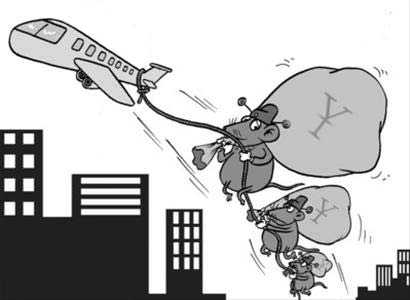
(Ecns.cn) -- A total of 18,487 Chinese officials hiding overseas were arrested on suspicion of corruption and embezzlement of public funds between 2000 and 2011, according to statistics released by the Supreme People's Procuratorate.
Scholars estimate that thousands of Chinese economic criminals are currently on the run in other countries, taking with them more than one trillion yuan (US$157 billion), reports China Economic Weekly.
With notorious fugitives such as Gao Shan, Yang Xiuzhu, Jiang Jifang and Cheng Sanchang still at large, government departments have beefed up measures to keep criminals from absconding to other countries and also tracking them down when they do.
On May 23, 2012, a conference focused on preventing corrupt officials from fleeing abroad was held in Beijing, gathering leaders from disciplinary inspection, judiciary and public security departments as well as the Ministry of Foreign Affairs.
Gan Yisheng, deputy secretary of the CPC Central Commission for Discipline Inspection, said government departments must cooperate to maximize the system's functional advantages and stop the illegal outflow of capital by corrupt officials.
A tighter net
Last year, the People's Bank of China released a report on corrupt fugitives which shocked the public. The report, attributed to the Chinese Academy of Social Sciences (CASS), said up to 18,000 officials had fled China between 1995 and 2008 with stolen assets totalling 800 billion yuan (US$125.7 billion).
Although the bank then claimed the figures were inaccurate, the report still brought the issue under closer government scrutiny.
According to the Supreme People's Procuratorate, compared to the large amount of money moved abroad by corrupt Chinese officials, about 54.19 billion yuan (US$8.51 billion) was recovered in 2005, 2007 and from 2009 to 2011.
Experts argue that figure is but a small fraction of the absconded capital. Li Chengyan, head of Peking University's clean government research center, estimates there are about 10,000 fugitive officials at large with over one trillion yuan (US$157 billion) overseas.
Since last year, the government has started monitoring the whereabouts of officials' families and assets, and various departments have begun cooperating to keep flight risks in the country. According to China Economic Weekly, the improved system has kept about 50 officials from fleeing China every day.
Moreover, with the enhancement of multilateral cooperation under the UN Convention against Corruption and the UN Convention against Transnational Organized Crime, arrests have become easier to carry out.
Cao Jianming, procurator-general of the Supreme People's Procuratorate of China, said that in 2011 foreign governments helped arrest 1,631 Chinese fugitives for "work-related crimes" and to recover 7.8 billion yuan (US$1.2 billion) in stolen assets.
Most escapees state employees
When Cao mentioned "work-related crimes," he was pointing to those mainly committed by officials and employees of state-owned enterprises, notes China Economic Weekly.
Of the corrupt fugitives, most were heads of state-owned enterprises with full control of their firms' operations and finance, reveals Li Chengyan.
Li also mentions a phenomenon called "naked officials," which refers to those who have moved their family abroad and taken assets with them. After their family members are beyond the control of the Chinese government, they then plan to flee the country, says Li.
According to the latest report on naked officials released by the CASS, 38.9 percent of officials and employees at state-owned enterprises think spouses should be allowed to emigrate; 46.7 percent say it is lawful to send their children abroad; and most argue that one does not have to be corrupt to be "naked."
Wang Minggao, a researcher, says most naked officials flee the country after they turn 50, when they have achieved high positions and accrued enough money. Lan Fu, the former deputy mayor of Xiamen Municipality who was later convicted on corruption charges, escaped when he was 59.
Some local governments have taken decisive action against the phenomenon. In January, Guangdong Province announced that officials whose families emigrate will be barred from high-level posts.
International barriers
Although transnational cooperation is improving, it is still very difficult to track down fugitives and bring them back, experts say.
At the time of writing, the U.S., Canada, Japan and most European countries had not signed extradition treaties with China, which has created the biggest hurdle to bringing fugitives home.
Moreover, fugitives often invest money in the countries they escape to, which can create financial friction between China and those countries, says China Economic Weekly.
China has signed extradition treaties with only 37 countries, and criminal justice agreements with 47 others. In countries that have not signed such documents, the cost of arresting fugitives is very high, says Li Chengyan.

Copyright ©1999-2011 Chinanews.com. All rights reserved.
Reproduction in whole or in part without permission is prohibited.